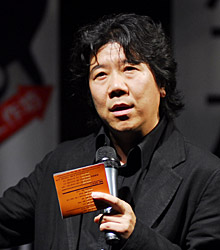| Avant-garde Director
 |
|
(CFP) |
Rhinoceros in Love, the masterpiece of China's prestigious drama director Meng Jinghui, were staged on August 7-12 at the Poly Theater in Beijing, marking a run that will include the play's commemorative thousandth performance.
Since its debut in 1999, five versions of the tragic romance have been performed in front of 368,000 people in 36 cities worldwide.
Rhinoceros in Love shows the love story of a rhino feeder, Ma Lu, and his pretty neighbor Ming Ming. The rhinoceros' poor vision serves as a metaphor in the story, symbolizing those who are deeply in love and yet blinded by the sadness of unrequited love.
Meng, 48, is one of the most influential drama directors in Asia. Meng's most influential plays include Comrade Ah Q, Waiting for Godot, Accidental Death of An Anarchist, Rhinoceros in Love and The Balcony.
Anti-dumping Review
China on August 8 started to reexamine anti-dumping measures it imposed on chloroprene rubber imported from a Japanese supplier, said the Ministry of Commerce.
The move came after the ministry received complaints that Japan Electric Chemical Co. increased dumping activities and flouted the country's anti-dumping measures.
Chinese chloroprene rubber producers filed an application for a reexamination of anti-dumping measures against the Japanese company's products.
In May 2005 the ministry imposed anti-dumping duties ranging from 2 percent to 151 percent on imported chloroprene rubber from Japan, the United States and the EU with a term of five years.
In 2011, the ministry extended the anti-dumping duties for another five years.
Chloroprene rubber, commonly known as Neoprene, is mostly used in manufacturing electrical cables and other types of cables, as well as waterproof products.
CPI Slowdown
The consumer price index (CPI), a key gauge of inflation, increased 1.8 percent year on year in July, the slowest pace since February 2010, the National Bureau of Statistics (NBS) said on August 9.
The rate was 0.4 percentage points lower than in June.
The easing inflation is explained as a result of the base effect. The CPI growth rate hit a 37-month high of 6.5 percent in July last year.
Food prices, which account for nearly one third of the weighing in the calculation of the CPI, edged up 2.4 percent in July from a year ago, down from an increase of 3.8 percent in June.
Food prices were mainly driven by an 8-percent hike of vegetable prices, as rain and flooding affected vegetable production in many places in a traditionally peak season of supply.
Stabilizing Pork Price
The government will purchase frozen pork to stabilize the market, as high hog production has led to falling prices, the National Development and Reform Commission (NDRC) said on August 7.
Due to a slow season and continued overproduction, pork prices have shown signs of sliding and will likely remain low for a period ahead, said the NDRC.
The NDRC advised farmers to weed out low-yield reproductive pigs and optimize the production structure to reduce losses.
Pork prices have generally shown a declining trend this year. In April, the hog-to-corn price ratio, a major indicator of the sector's profitability, fell under 6 to 1, the break-even point for farmers.
To avoid drastic price fluctuations, the government then initiated a round of frozen pork purchases. Price drops narrowed in May and reversed to moderate gains in June and July.
Pork prices are an important component in food prices, which have a one-third weighing in the calculation of the CPI.
Online Business Boom
An increasing number of Chinese enterprises have taken to the Internet to do business in light of the current economic downturn, according to data from the country's Internet regulator.
China had 8.73 million registered domain names at the end of June, and 3.98 million were registered using ".cn" domain names, up 460,000 from the end of 2011, marking the fastest biannual growth since 2008, the China Internet Network Information Center (CNNIC) said on August 6.
The ".cn" suffix is a so-called Top Level Domain for China, like ".com" or ".net," and individuals and companies seeking to create a Web address are required to be approved by CNNIC.
Of those newly added ".cn" websites, about 71 percent were domestic companies, particularly small and medium-sized enterprises (SMEs).
"This shows that a number of SMEs are beginning to promote their own brands and services through the Internet," CNNIC said in a statement.
China has the world's largest number of Internet users, with an online population of 538 million by the end of June, including 210 million online shoppers.
China's e-commerce transactions totaled 5.88 trillion yuan ($933 billion) last year, up 29.2 percent year on year, according to the Ministry of Commerce. Over 40 percent of Chinese SMEs have used e-commerce to maintain rapid growth, as a worsening external environment, rising labor costs and tightened credit have created difficulties for SMEs.
Effective Boost
The government's measures encouraging private funds to enter more sectors have worked and helped stabilize investment growth this year, according to the NDRC's investment department.
The measures encouraging private capital to enter fields such as oil and gas exploration and education have been playing an active role since the beginning of this year, according to the department. Private investment in the oil and gas exploration, education and health sectors surged 89.2 percent, 40.2 percent and 43.1 percent, respectively, in the first half of this year.
The small quantity of private funds in those sectors also helped yield rapid growth, since such fields used to be dominated by state-owned capital.
Earlier in June, the NDRC and the Ministry of Finance issued a joint statement vowing to treat government funds and private capital equally in order to create a better business environment for private entrepreneurs. | 